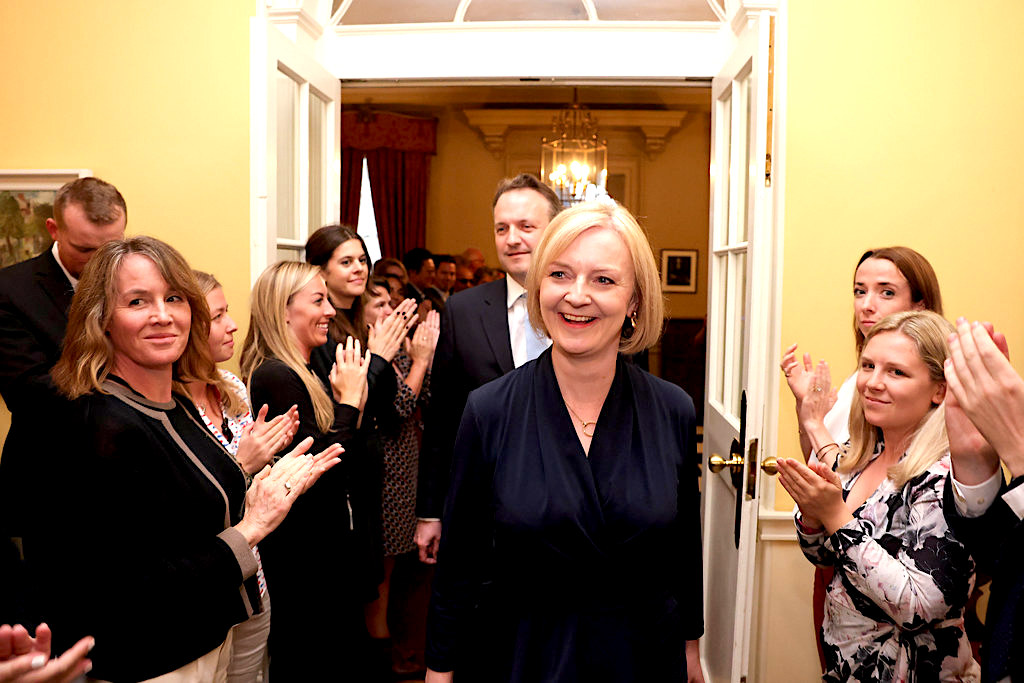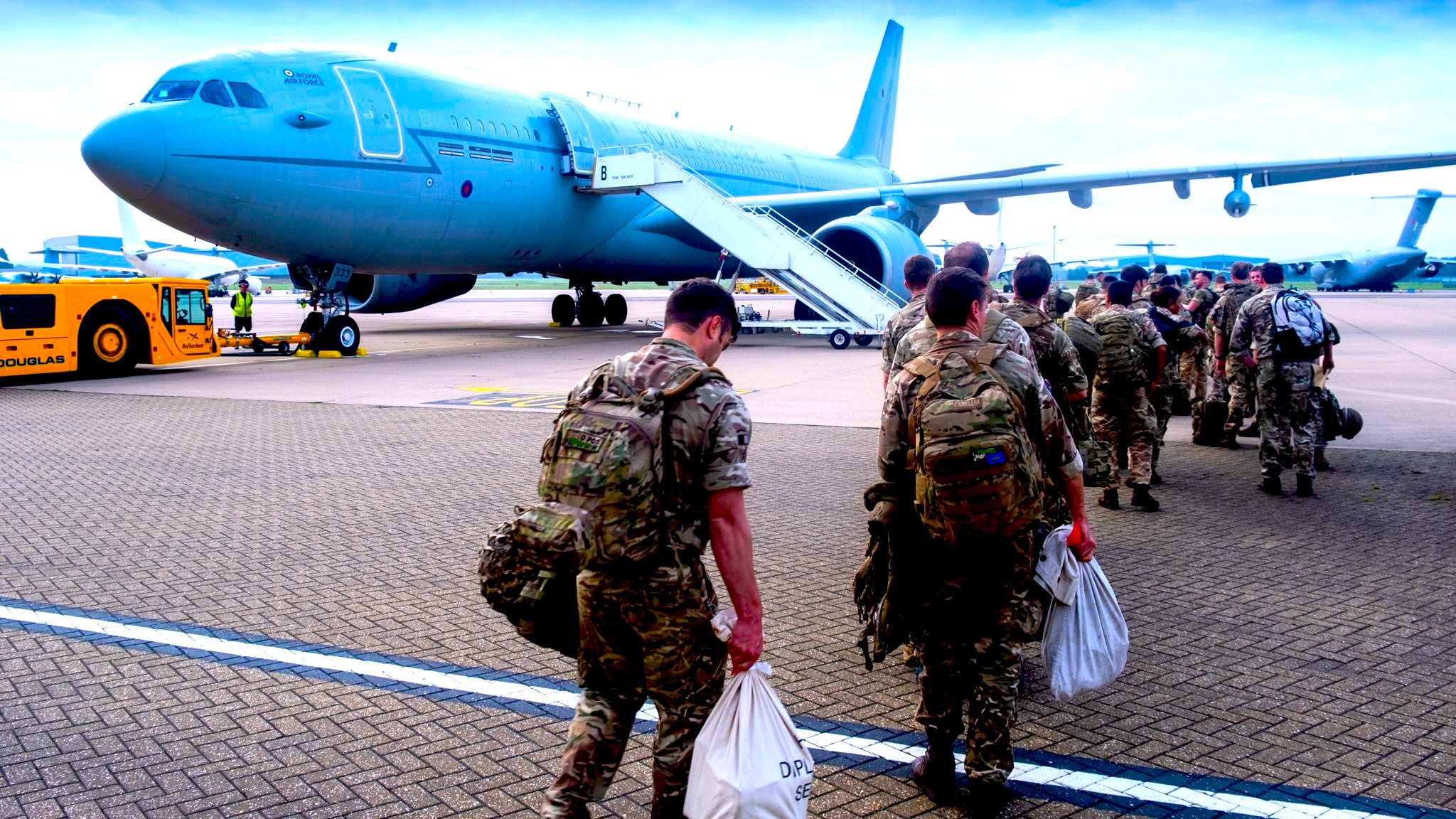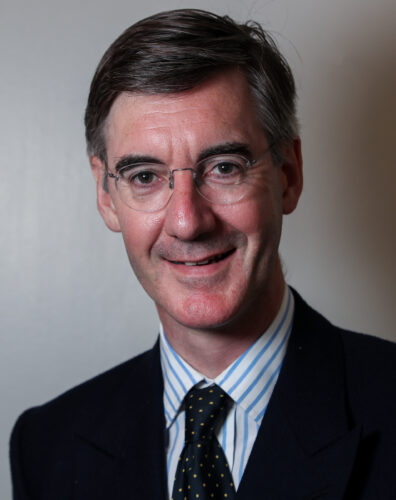Paul Rogers says that the government of Liz Truss, for all its militarism, will stoke public backlash by ignoring the greatest single threat to global human security.

Newly elected Prime Minister Liz Truss arrives at No.10 Downing Street on Sept. 6. (Andrew Parsons / No 10 Downing Street)
By Paul Rogers
openDemocracy
 Liz Truss, the U.K.’s new prime minister, places a high premium on loyalty. This is why many former members of the cabinet, however experienced, have been relegated to the backbenches. There is, though, one survivor from the Cameron-Clegg coalition era — Truss herself.
Liz Truss, the U.K.’s new prime minister, places a high premium on loyalty. This is why many former members of the cabinet, however experienced, have been relegated to the backbenches. There is, though, one survivor from the Cameron-Clegg coalition era — Truss herself.
In keeping with her own politics, the market fundamentalism of the Tufton Street brigade is very much in evidence in her choices of both ministers and advisers — and in her response to the energy crisis. This will be met by a price cap, but that will be achieved by loans of up to £130bn that will have to be repaid by the public, with the massive profits of the fossil carbon corporations scarcely affected.
Meanwhile, the obscene maldistribution of wealth in the U.K. continues. The country’s billionaires have now accumulated more than £600bn of wealth, with the top 10 on the Sunday Times Rich List amassing £176bn between them – but perish the thought that wealth redistribution or even windfall taxes should be mentioned in polite company.
This issue of who pays extends to a major element of Truss’s wider politics: defence policy. A key context, much in tune with grassroots Tories, is that the U.K. is one of the world’s great powers, to be demonstrated by increasing military spending to 3 percent of national income by 2030. This is the biggest hike since the 1950s, even though military spending went up under Boris Johnson, largely by diverting money from the international aid programme.
Truss’s plan goes very much further. According to a leading defence economist, professor Malcolm Chalmers from the Royal United Services Institute (RUSI), this substantially increased spending will run to an additional £157bn at current prices. Chalmers points out that unless there are even more cuts in public spending, this would require income tax to increase by 5p in the pound, or for the standard VAT rate to rise from 20 to 25 percent.
Even if this were to be achieved, it leaves unsolved the much bigger issue of whether Britain’s current defence posture is relevant to the security challenges ahead, not least in terms of recent performance, let alone monetary efficiency.
Military Failures & Inefficiency

British soldiers deploying to Kabul to assist in the NATO withdrawal on Aug. 13, 2021. (Ministry of Defence, Wikimedia Commons)
On the issue of performance, the evidence is damning. During the past two decades, the U.K. has been a core player in three failed wars and one that is currently failing.
Of the failed wars, the longest has been the 20 years of the Afghanistan war, but the Iraq conflict has been similarly disastrous, with violence and instability continuing and a violent death toll currently standing at 288,000, the great majority of them civilians.
The 2011 Franco-British war in Libya left a deeply unstable and volatile country serving as a conduit for extreme paramilitaries and weapons spreading across the Sahel. Even the presumed defeat of ISIS in the 2014-18 air war has turned out to be anything but, as groups linked to ISIS and Al Qaeda grow elsewhere, especially in northern and eastern Africa.
As to efficiency in the U.K. military-industrial complex, this is little short of a joke. The lack of efficiency has shown itself repeatedly, with persistent cost overruns, long delays in programmes and embarrassing failures of highly expensive new items, the recent breakdown of HMS Prince of Wales being just the latest case.
Donate Today to CN’s 2022 Fall Fund Drive
The U.K.’s National Infrastructure Authority has done its best for years to keep tabs on dodgy programmes. Four years ago, these reached a peak when five systems under development and collectively costed at just short of £16bn were all red-flagged (at risk of collapse) at the same time.
Part of the problem is that Britain’s military-industrial complex is very much a closed system that requires enemies in order to thrive and, if need be, can always resort to appeals for patriotism. It is a thoroughly integrated system comprising the military, arms manufacturers, civil servants, think tanks, security and intelligence agencies and university departments, with trades unions necessarily looking out for their members.
Truss’ defence stance, however unaffordable, will go down very well in these circles. It is, after all, nothing new. Five years ago, when Boris Johnson was foreign secretary, he gave that year’s Tory party conference his “let the British lion roar” speech, all about a renewed greatness rooted in the military.
Eighteen months later came the retro-fantasy of a new global Britain favoured by Gavin Williamson during his brief sojourn at the Ministry of Defence. This quasi-imperial, post-Brexit lurch, just like Johnson’s speech, is likely to be reeled out in the months ahead, with enemies such as Russia, China, Islamists and others all serving to remind the public of the need for strong defence.
Ignoring Climate Crisis
Ordinarily, this might be expected to work, but there is one very awkward element that suggests otherwise. It also stands to cause Truss really serious problems.

Jacob Rees-Mogg in 2019. (Ben Shread/MoD/Wikimedia Commons)
One aspect of her political make-up that was evident during the leadership campaign is an almost total ignoring of the challenge of climate change, reinforced last week by her decision to promote an arch-climate sceptic, Jacob Rees-Mogg, to the energy brief.
This should come as no surprise. After all, when the Tories won an overall victory in the 2015 election and were no longer encumbered with the Lib Dems, they immediately took an axe to many of the decarbonising initiatives advocated by Labour before 2010 and maintained by the Lib Dems during the five-year coalition.
These included reducing support for solar power and electric vehicles; stopping subsidies for onshore wind while increasing them for North Sea oil; privatising the Green Development Bank; and scrapping the “zero carbon homes” plan due to ensure all new homes would be carbon-neutral from 2016.
These lost the U.K. years in decarbonisation, making the current energy crisis even worse.
What is perhaps forgotten is that the environment minister at the time was a rising young Tory politician by the name of Liz Truss.
Now, we have an entire government minimising the climate crisis just when it is becoming blindingly obvious that it is the greatest single threat to global human security.
The government may ignore this but the people won’t – and we can be certain that it will emerge rapidly, before the next general election, to be a focus of mounting public anger and action that will far transcend the activities to date of Extinction Rebellion and other activist and campaigning groups.
Even as we face a recession and a winter of crisis for so many people, this may yet come to be the defining crisis of Truss’s time in Downing Street.
Paul Rogers is emeritus professor of peace studies in the Department of Peace Studies and International Relations at Bradford University and an honorary fellow at the Joint Service Command and Staff College. He is openDemocracy’s international security correspondent. He is on Twitter at: @ProfPRogers.
This article is from openDemocracy.
The views expressed are solely those of the author and may or may not reflect those of Consortium News.
Donate Today to CN’s
2022 Fall Fund Drive
Donate securely by credit card or check by clicking the red button:

The attraction of military spending to people like Truss is that it stimulates the economy without producing products that would benefit ordinary people. Wealth is, therefore, not re-distributed.
If the government were to build houses, then that would benefit ordinary people and add to their wealth. That is why it is ruled out by the likes of Truss and Starmer.
Never a more unqualified and incompetent person appointed (note: NOT elected) to the office of prime minister. It’s a poisoned chalice but she doesn’t know it yet. She naively thinks she can do the job, but in my view there is no possibility of anything good coming from her, her cabinet, her government, or the Tory party. They are tearing the country apart to line their own pockets.
So much for democracy in the UK.
“the U.K. military-industrial complex, this is little short of a joke. “. A very sick joke.
The major players in UK Defence are on the whole NOT ‘British’, they are American, French and European. Washington has a big input into UK Defence, controlling the Nuclear capability and ensuring/mandating the UK buys American. With multiple USA military bases, including the NSA, on site the UK is just a USA outpost. And Truss the puppet is just Uncle Joe’s latest sniff.
We have more food banks than branches of McDonalds, people unable to afford food and heating, a health service that gave up providing health care two years ago and electric infrastructure on the edge of collapse. We are one cold winter away from total disaster, indeed we are screwed. Parliament is our enemy, not Russia or China.
Yes, despite the majority of the British electorate having no say in the matter, she was simply boosted by the Conservative parties membership of toxic watery viruses, to the post.
This fraudulent system still goes by the name of democracy!
A democracy, contained in a Monarchy, is an even sicker joke than a Corpocracy; worse even than back in the times of the feudal Middle Ages for this is occurring in an enlightened era! Ha! Ha!
If it walks like a duck, if it quacks like a duck (this individual certainly does), then what else is it?
Quite simply the Tories are the enemy of the people, there is not a single facet of UK life or public service that has improved since they were elected in 2010, everything has gone to the dogs.
Democracy doesn’t work with an uneducated public who repeatedly fall for the spin in the corporate media that they are better of with them in charge. Even with monopolistic private water companies knowingly releasing millions of litres raw sewage in our rivers & beaches the public and the supine bbc remain silent, this is an open-goal for the opposition to score-in but not a word from the corporate stooge opposition leader that is Keir Starmer.
It’s Murdoch, Rothermere & the Barclay Brothers decide who gets elected in this sham democracy.
It’s just so depressing and I don’t see anything changing as people don’t seem to care anymore
You’re right. People don’t care any more. And they haven’t the gumption to do any research for themselves. They blindly believe/follow the manipulating narrative of the controlling msm/tv. It is depressing and alarming.
It’s just as bad in the un-United States! Too many people in this country have little knowledge of geopolitics nor do they care. Sports, Entertainment venues and their Smartphones are the prevalent factor in modern America.
Several weeks ago, a cousin of mine in Florida and a lady friend of hers were shopping at a department store. Her friend wrote out a check for the purchase at the checkout counter on a bank in Wyoming, where she is from. The cashier looked at the check and said: this isn’t a local bank. What state is Wyoming in?” The woman said, “Are you serious?” The cashier said: “Is Wyoming in Florida?”
BTW, the cashier was an American,between 25 -30 years old, according to my cousin.
“Truth tis stranger than fiction,” eh?
I do not believe that the alternate PM, Kier Starmer, will make an election issue of global heating. The people may shout loudly, but they have no champion. Who will emerge to fill that role?
The climate emergency has vanished from our corpirate Empire friendly media in favour of the suffocating avalanche of propaganda in the run up to WW3. We are screwed.
I don’t believe there was ever any “substantial” climate emergency information from the msm. But the “avalanche of propaganda” is certainly gathering speed and inventiveness in its rhetoric and fictions. WW3? That’s anyone’s guess. But either way, we are screwed.